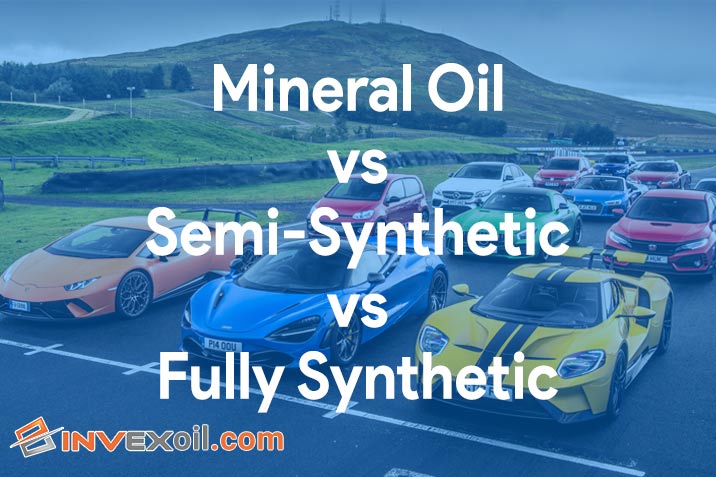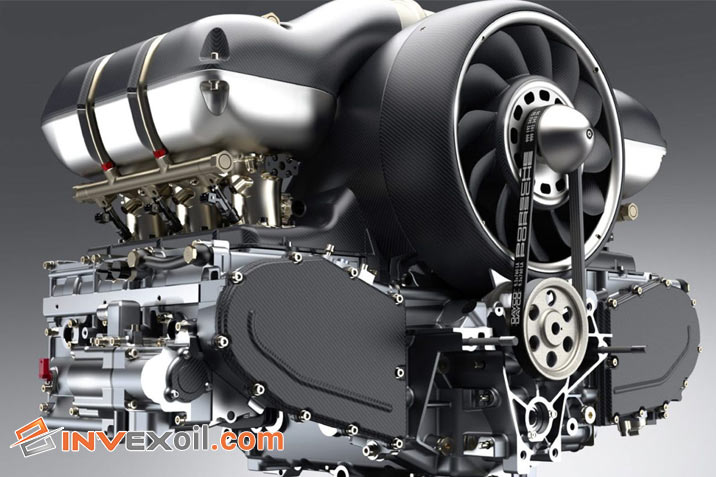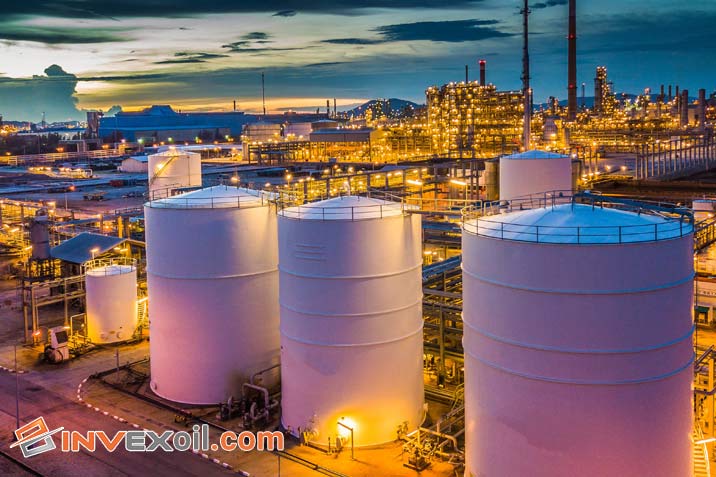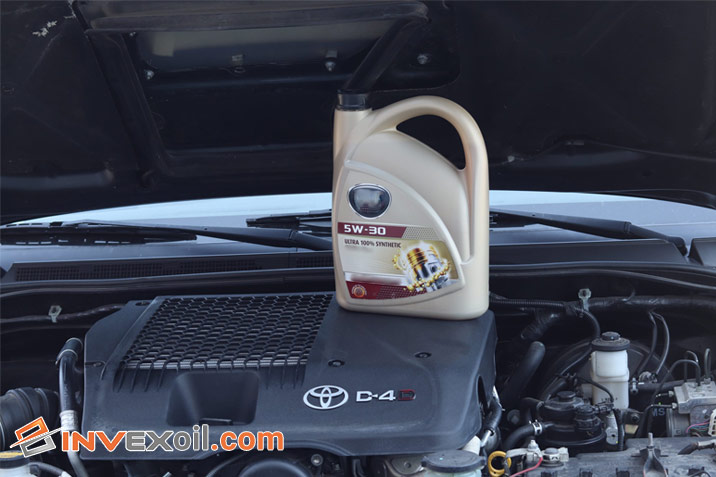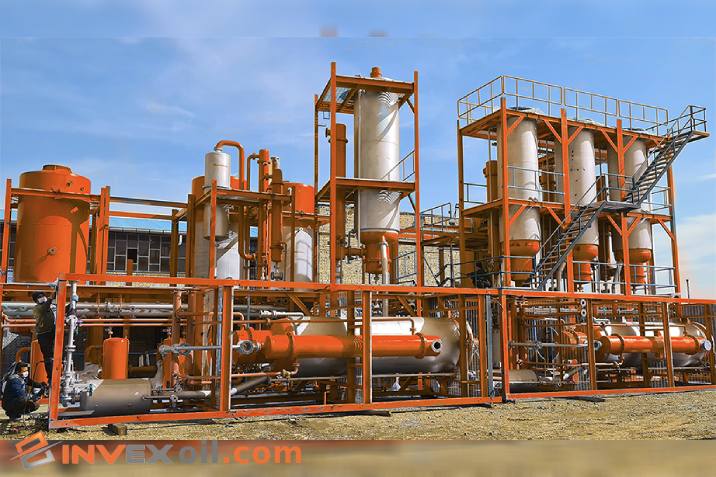In the age of technology, we are going to Decipherer of the Differences Between Mineral oil vs Semi synthetic oil vs Fully synthetic Engine Oils. In order to keep your vehicle running smoothly, you need to know the key information between these three types of motor oil, such as the ingredients, production methods, and how the Oil re-refinery. In this article, we are giving you unique properties and applications, to ensure you have enough knowledge to buy the best engine oil for your car.
Table of Contents
What Are these 3 Types of Oil?
As you read about Engine oil in the last posts, engine oil is super necessary for the smooth operation of engines, and there are 3 primary types of engine oils: mineral oil, semi-synthetic oil, and fully synthetic oil. We know that Each of these oils is used for a particular purpose and offers unique characteristics that some kinds of engines require.
First of them : Mineral Oil
Mineral oil, the first part of them and also known as conventional oil, comes from crude oil through a refining process. It is the most basic form of engine oil and is suitable for older engines or those with less demanding performance requirements.
In this table, we learn about Key Properties of Mineral Oil:
| Property | Value |
| Viscosity | Moderate |
| Density | Medium |
| Flash Point | Lower |
| Additive Content | Minimal |
| Cost | Economical |
Second one : Semi-Synthetic Oil
There are different types of engine oils, including semi-synthetic oil. In addition to its unique blend, it offers a number of qualities that makes it an ideal choice for many vehicles. As we explore semi-synthetic oil in this section, we will explore its definition, key characteristics, and why it lies between mineral oils and fully synthetic ones.
Oil that is semi-synthetic is a blend of mineral oil and synthetic oil. It is also called synthetic blend oil. This combination aims to harness the strengths of both types while mitigating their weaknesses. But what exactly are these strengths and weaknesses, and why might you consider using semi-synthetic oil for your engine?
Characteristics of Semi-Synthetic Oil
in this table, we offer a Comparison of oils for know better Mineral Oil vs Semi-Synthetic vs Fully Synthetic Engine Oils:
| Characteristic | Semi-Synthetic Oil | Mineral Oil | Fully Synthetic Oil |
| Base Oil Composition | Blend of natural and synthetic components | Refined crude oil | Pure synthetic compounds |
| Viscosity | Variable, optimized for a wide range of temperatures | Moderate | Optimal across temperature ranges |
| Density | Medium | Medium | Low |
| Additive Content | Balanced | Minimal | Extensive |
| Cost | Affordable | Economical | Premium |
Why Choose Semi-Synthetic Oil?
Here are a few reasons:
-
Balanced Performance:
The semi-synthetic oil is a compromise between mineral and fully synthetic oils. By comparison with fully synthetic oils, it offers better performance while remaining cost-effective.
-
Versatile Viscosity:
In addition to its variable viscosity, semi-synthetic oil can handle a wider range of operating temperatures, making it suitable for a variety of climates.
-
Moderate Cost:
While semi-synthetic oil isn’t as affordable as mineral oil, it is a good choice for those who want better performance without paying a premium price.
Last one: Fully Synthetic Oil
In the realm of engine oils, fully synthetic oil stands out as a top-tier lubricant known for its exceptional qualities. In this section, we will uncover the attributes of fully synthetic oil, including its definition, remarkable characteristics, and the reasons it is considered a top-tier engine lubricant.
Fully Synthetic Oil Definition Fully synthetic oil is engineered from pure chemical compounds, and synthesized to meet the most demanding engine requirements. Unlike mineral oil or semi-synthetic oil, it contains no impurities or natural elements.
Characteristics of Fully Synthetic Oil
Now, we are going to learn more about each characteristic of Fully Synthetic Oil:
- Optimal Viscosity: Fully synthetic oil boasts optimal viscosity across a wide temperature range. This means it maintains excellent flow and protection whether you’re in extreme heat or cold, ensuring your engine runs smoothly.
- Low Density: With low density, fully synthetic oil reduces friction within the engine, leading to improved fuel efficiency and reduced wear and tear.
- High Flash Point: The high flash point of fully synthetic oil means it can withstand extreme heat conditions without breaking down, making it ideal for high-performance engines.
- Extensive Additive Content: Fully synthetic oil is enriched with a wide range of additives that enhance its performance. These additives offer superior protection against engine deposits, corrosion, and wear.
- Premium Cost: While the benefits of fully synthetic oil are clear, it does come at a premium cost compared to other types of engine oil. However, this cost is often justified by the extended oil change intervals and overall engine longevity it provides.
Differences Between Mineral oil vs Semi synthetic oil vs Fully Synthetic
There are many engine oils available on the market today, but choosing the right one for your vehicle, industry, or anything else for that matter, can be a difficult task. To help you choose the best oil, we want to compare and contrast the differences between mineral oil, semi-synthetic oil, and fully synthetic oil, to help you determine which oil is best for your needs by showing you their performance, composition, and application details.
Wear Protection
Mineral oil provides moderate wear protection, while semi-synthetic oil strikes a balance between mineral and fully synthetic oils, offering balanced protection. Fully synthetic oil excels in this aspect, providing excellent wear protection, which is especially crucial for high-performance engines.
Temperature Stability
Mineral oil’s temperature stability is fair, making it less suitable for extreme conditions. Semi-synthetic oil offers good stability, while fully synthetic oil stands out with outstanding temperature stability, making it ideal for varying climates and high-performance engines.
Cost
Mineral oil is the most economical option, while semi-synthetic oil provides affordability with improved performance. Fully synthetic oil, although premium-priced, justifies its cost with extended change intervals and optimized engine performance.
Fuel Efficiency
When compared to mineral oil, semi-synthetic oil improves the fuel efficiency of the engine, which makes it a good choice for individuals looking to save fuel costs as well. This fully synthetic oil goes to the next level in terms of fuel efficiency, optimizing engine performance and reducing fuel consumption in the process.
Change Intervals
Mineral oil typically requires more frequent oil changes. Semi-synthetic oil maintains standard change intervals. Fully synthetic oil extends these intervals, reducing maintenance frequency and cost.
Additive Content
Mineral oil contains minimal additives. Semi-synthetic oil strikes a balance with balanced additives, and fully synthetic oil boasts extensive additive content, providing enhanced engine protection.
Engine Compatibility
Mineral oil is suitable for older engines. Semi-synthetic oil is versatile and can be used in a wide range of engines. Fully synthetic oil is engineered for modern, high-performance engines, offering top-tier protection.
Advantages and Disadvantages of Each Type of Oil
When it comes to selecting the right engine oil for your vehicle, it is crucial to know the pros and cons of each type of oil before making your decision. As we proceed through this section, we will be looking at the advantages and disadvantages of mineral oil, semi-synthetic oil, and fully synthetic oil, along with their respective pros and cons. As a result of this analysis, readers will be able to gain a better understanding of the trade-offs involved in choosing one type of oil over another that is quite different from the other.
And now this table shows us the summarized strengths and weaknesses of each type of engine oil. Then after this table, we are going to check all of them together in a few sentences:
| Aspect | Mineral Oil | Semi-Synthetic Oil | Fully Synthetic Oil |
| Advantages | – Economical | – Improved performance | – Excellent performance in all conditions |
| – Widely available | – Affordable | – Optimal engine protection | |
| – Suitable for older engines | – Balanced characteristics | – Extended oil change intervals | |
| Disadvantages | – Limited high-temperature | – Moderate cost | – Higher cost |
| performance | – Not as high-performing as fully | – Not suitable for all engine types | |
| – Frequent oil changes needed | synthetic oil | – Overkill for some vehicles |
Advantages of Mineral Oil:
- Economical choice for budget-conscious vehicle owners.
- Widely available and suitable for older engines.
- Easily found in most auto parts stores.
Disadvantages of Mineral Oil:
- Limited high-temperature performance.
- Requires more frequent oil changes.
- Not the best choice for high-performance or modern engines.
Advantages of Semi-Synthetic Oil:
- Improved performance compared to mineral oil.
- Affordable and strikes a balance between cost and performance.
- Suitable for a wide range of engines.
Disadvantages of Semi-Synthetic Oil:
- Not as high-performing as fully synthetic oil.
- Moderate cost, but not as budget-friendly as mineral oil.
Advantages of Fully Synthetic Oil:
- Excellent performance in all conditions, including extreme temperatures.
- Provides optimal engine protection.
- Offers extended oil change intervals, reducing maintenance frequency.
Disadvantages of Fully Synthetic Oil:
- Comes at a higher cost compared to other types.
- Not suitable for all engine types, can be overkill for some vehicles.
What Is Oil Used For? with present examples
Engine oils, including Mineral oil vs Semi synthetic oil vs Fully synthetic, are important and useful in many industries, including the oil, gas, and chemistry industries. Now we will check real-world examples and applications of these engine oils and also show their practical uses across different industries.
After all, we have a table about diverse applications of mineral oil, semi-synthetic oil, and fully synthetic oil in various industries and where they used for:
| Industry/Application | Mineral Oil | Semi-Synthetic Oil | Fully Synthetic Oil |
| Automotive | – Lubricating internal combustion engines | – Engine lubrication | – High-performance engine lubrication |
| *** | – Transmissions and gearboxes | – Racing engines and high-performance vehicles | |
| – Hydraulic systems | – Hydraulic systems | – Hydraulic systems | |
| Aviation | – Piston and turbine engines | – Aircraft engines | – Jet engines |
| – Hydraulic systems | – Hydraulic systems | – Hydraulic systems | |
| Chemical Manufacturing | – Machinery and equipment lubrication | – Specialized machinery lubrication | – Precision machinery lubrication |
| *** | – Heat transfer and cooling fluids | *** | |
| Oil and Gas | – Drilling and extraction equipment lubrication | – Drill rigs and extraction equipment lubrication | – Extreme drilling conditions and extraction |
| – Compressors and turbines lubrication | – Compressor and turbine lubrication | – High-speed compressors and turbines lubrication | |
| *** | – Heat transfer and hydraulic systems | – High-temperature and high-pressure conditions |
Conclusion
In this article, we covered many aspects of the intricacies of Mineral Oil vs Semi-Synthetic vs Fully Synthetic Engine Oils, to understand fully their distinct characteristics and applications in the automotive and industrial sectors. We understand that selecting the right engine oil is pivotal for optimal performance and longevity. Mineral oil offers affordability, semi-synthetic oil strikes a balance, and fully synthetic oil excels in extreme conditions. These differences are critical in ensuring your engine operates at its best. So, whether you’re driving a vehicle or managing industrial machinery, make an informed choice to safeguard your engine’s efficiency and durability.
FAQ
What are the key differences between Mineral oil vs Semi synthetic oil vs Fully synthetic?
These oils vary in composition, with mineral oil being natural, semi-synthetic a blend, and fully synthetic entirely synthetic. Their performance and applications differ accordingly.
Which type of engine oil is best for high-performance vehicles?
Fully synthetic oil is often the preferred choice for high-performance vehicles due to its superior protection and extended change intervals.
Are there cost differences between these engine oils?
Yes, there are cost variations. Mineral oil is economical, semi-synthetic offers a balance, and fully synthetic tends to be costlier due to its advanced properties.

Hello, This is Matteo Hudson Copywriter from InvexOil. We are here to provide super-important content to help you learn more easily and be involved in the world of Petroleum and Chemistry. We are here to answer your questions, help you to have better services, and also find the best solution for your problems. Don’t be shy and ask your questions in the comment box or call our number. If you want to connect with me directly, you can search for my name on Linkedin.

